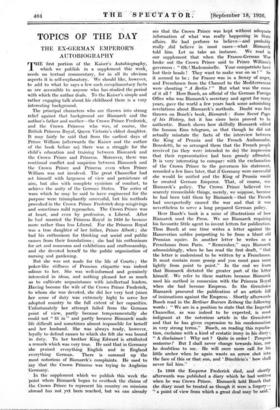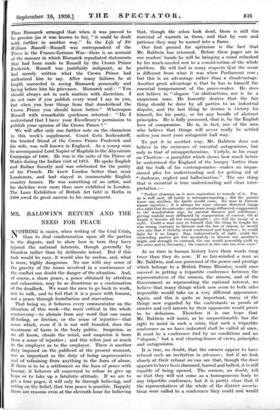TOPICS OF THE DAY THE EX-GERMAN EMPEROR'S AUTOBIOGRAPHY
THE first portion of the Kaiser's Autobiography, which we publish in a supplement this week, needs no textual commentary, for in all its obvious aspects it is self-explanatory. We should like, however, to add to what he says a few such complimentary facts as are accessible to anyone who has studied the period with which the author deals. To the Kaiser's simple and rather engaging talk about his childhood there is a very interesting background.
The principal characters who are thrown into strong relief against that background are Bismarck and the author's father and mother—the Crown Prince Frederick, and the Crown Princess who was, of course, the British Princess Royal, Queen Victoria's eldest daughter. It may fairly be said that from the earliest days of Prince William (afterwards the Kaiser and the author of the book before us) there was a struggle for the child's educatiOn and training between Bismarck and the Crown Prince and Princess. Moreover, there was continual conflict and suspicion between Bismarck and the Crown Prince and Princess even when Prince William was not involved. The great Chancellor had set himself with largeness of view and persistence of aim, but also with complete cynicism of conduct, to achieve the unity of the German States. The series of wars which he may be said to have engineered for the purpose were triumphantly successful, but his methods provoked in the Crown Prince Frederick deep misgivings and sometimes mild reproaches. The Crown Prince was at 'heart, and even by profession, a Liberal. After he had married the Princess Royal in 1858 he became more rather than less Liberal. For the Princess Royal was a true daughter of her father, Prince Albert ; she had his enthusiasm for thinking out social and public causes from their foundations ; she had his enthusiasm for art and museums and exhibitions and craftsmanship, and she devoted herself to the- public organization of nursing and gardening. • - But she was not made for the life of Courts ; the poker-like stiffness of Prussian etiquette was indeed odious to her. She was well-informed and genuinely interested in ideas, and nothing pleased her so -much as to cultivate acquaintance with' intellectual leaders. Having become the wife of the Crown Prince Frederick, to whom she was devoted, =she did her very best (since her sense of duty was extremely high) to serve her adopted country to the full extent of her capacities. 'Unfortunately her attempt failed from the German point of view, partly because temperamentally she could not " fit in " and partly because Bismarck made life difficult and sometimes -almost irnPossible for herself and her husband. She was always ready, however, 'loyally to defend causes to which she felt she was bound in duty. To her brother King Edward is attributed a remark which was very true. He said that in Germany she praised everything English and' in England everything German. There is summed up the most notorious of Bismarck's complaints. He used to say that the Crown Princess was trying to Anglicize GermanY.
In the supplement which we publish this week the point where Bisinarck began to overlook the claims of the Crown Prince to represent his country- on missions abroad has not yet been •reached, but we can already see that the Crown Prince was kept without adequate information of what' was really 'happening in State affairs. He had perforce to believe—and probably really .did believe in most cases—what Bismarck told him. Let us take an instance. We read in our supplement that when the Franco-German War broke out the Crown Prince said to Prince William's governess : " Oh ! Mademoiselle. Your compatriots have lost their heads ! They want to make war on us ! " So it seemed to be ; for France was in a frenzy of anger, and Frenchmen from the Channel to the Mediterranean were shouting " A Berlin ! " But what was the cause of it all ? Herr Busch, an official of the German Foreign Office who was Bismarck's secretary and agent for many years, gave the world a few years back some astonishing revelations about Bismarck's methods. Doubt was first thrown on Blisch's book, Bismarck : Some Secret Pages of his History, but it has since been proved to be authentic. Busch shows how skilfully Bismarck edited the fanious Ems telegram, so that though he did not actually misstate the facts of the ' interview between the King of Prussia and the French Ambassador, Benedetti, he so arranged them that the French people received (as they were intended to do) the impression that their representative had been grossly affronted. It is very interesting to compare with the exclamation of the Crown Prince to the governess his statement, recorded a few lines later, that if Germany were successful she would be unified and the King of Pruisid would be created German EMperor. That, of course, was Bismarck's polick. The CroWn Prince believed twc scarcely reconcilable things, merely, we suppose, because he had been told them by arckthat the French had unexpectedly caused the war and that it was nevertheless to serve a long prepared German policy.
Herr Busch's book is a mine of illustrations of how Bismarck used the Press. We see Bismarck requiring his favourite little agent to invent letters for publication. Thus Busch at one time writes a letter against the Hanoverian nobles purporting to be from a blunt old Prussian squire. In another letter he writes as a Frenchman from Paris. " Remember," says Bismarck admonishingly, when he has read the first draft, " that the letter is understood to be written by a Frenchman. It must contain more gossip and you must pass more lightly from point to point." In the end we learn that Bismarck dictated the greater part , of the letter himself. We refer to these matters because Bismarck used his method in connexion with the Princess Royal when she had become Empress. In the Grenzboten Bismarck procured the publication of an article full of insinuations against the Empress. Shortly afterwards Busch read in the Berliner Boersen Zeitung the- following words : " We are in a position to state that the Imperial Chancellor, as was indeed to be expected, is most indignant at the notorious article in the Grenzboten and that he has given expression to his condemnation in very strong terms." Busch, on reading this repudia- tion, exclaims with a kind of ecstatic irony in his diary ; " A disclaimer ! Why- not ? Quite in order ! Tempora mutantur? But I shall never change towards him, nor he doubtless to me. - He will once more cell. for his little archer when he again wants an arrow shot into the face of this or that sun; and Bfischlein's ' bow shall never fail him."
In 1888 the Emperor Frederick died, and shortly afterwards was published a diary which he had written when he was Crown Prince. Bismarck told Busch that the diary must be treated as though it were a forgery- " a point of view from which a great deal may be said. Then Bismarck arranged that when it was proved to be genuine (as it was known to be), " it could be dealt with further in another way." In the Life of Sir TI illiam Russell—Russell was correspOndent of the Times in the Franco-German War—there is an account of the manner in which Bismarck repudiated statements that had been made to Russell by the Crown" Prince Frederick. Russell was justifiably indignant, as he had merely written what the Crown Prince had authorized him to say. After Many failures he at length succeeded in seeing Bismarck personally and laying before him his grievance. Bismarck said : " You should always act in such matters with discretion. I do not care if you publish every word I say to you, but when you hear things from that dunderhead the Crown Prince you should know better." Whereupon Russell with remarkable quickness retorted : " Do I understand that I have your Excellency's permission to publish your opinion of the Crown Prince ? "
We will offer only one further note on the characters in this week's supplement. Count Gotz Seckendorff, the trusted friend of the Crown Prince Frederick and his wife, was well known in England. As a young man he accompanied Lord Napier of Magdala in the Abyssinian Campaign of 1868. He was in the suite of the Prince of Wales during the Indian visit of 1875. He spoke English and Italian fluently and was celebrated for the purity of his French. He knew London better than most Londoners, and had stayed in innumerable English country houses. He was something of an artist, and his sketches were more than once exhibited in London. The Loan Exhibition of British Art held in Berlin in 1908 owed its great success to his management.































































 Previous page
Previous page